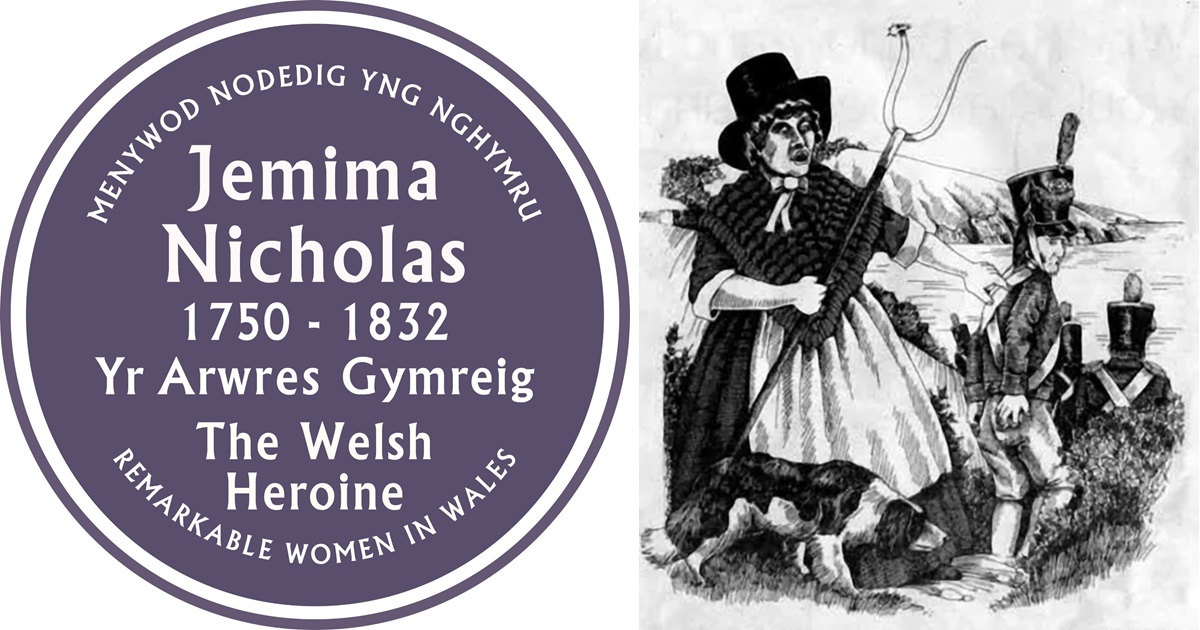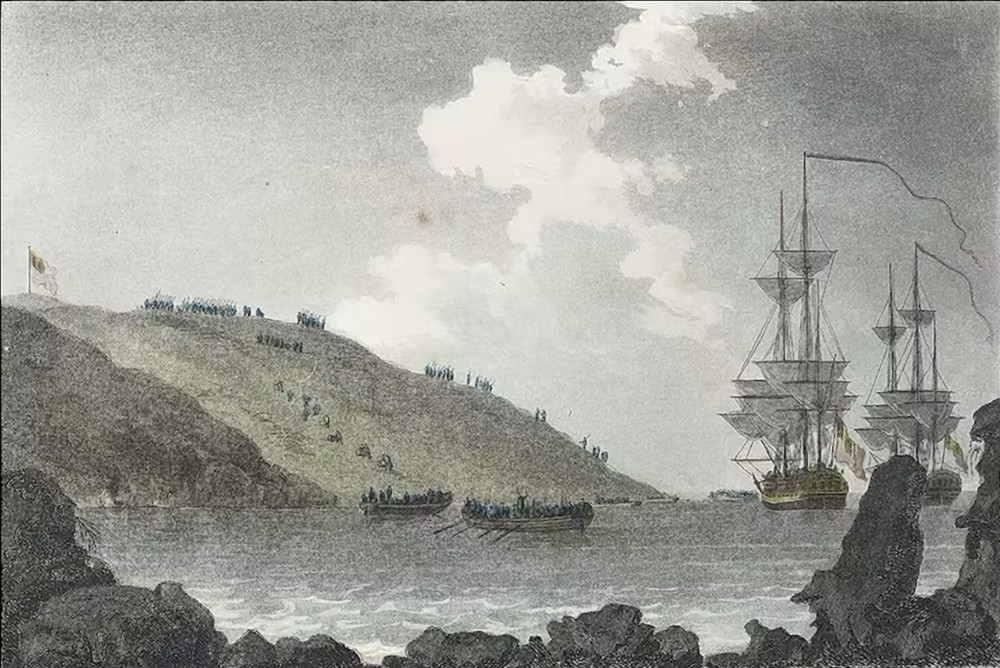Plaque unveiled to honour Jemima Nicholas, who repelled a French invasion of Wales

Martin Shipton
Wales’ 15th Purple Plaque is to be unveiled to honour the woman who faced down the challenge of an invasion by 1,200 French troops in Fishguard in February 1797 – the last invasion of British soil by an enemy force anywhere in the UK.
While local militia and volunteer troops awaited reinforcements from Milford Haven and Haverfordwest, 47-year-old cobbler Jemima Nicholas led a band of women into the fray on Strumble Head and rounded up a dozen French revolutionary troops armed only with a pitchfork and her sheer courage.
The plaque is being unveiled at Fishguard Town Hall today (24 February 24)
Local legend
The story of Jemima Nicholas has become so-well known in parts of Wales that she is often simply referred to as ‘Jemima’, and is seen as something of a local legend, but her story is based in truth, explains Professor Tony Davies, trustee of the Fishguard Invasion Centre Trust Ltd which was formed to celebrate the bi-centenary of the failed French invasion.

The Cardiff University emeritus professor said, “Four ships anchored off Carreg Wastad point on Strumble Head and discharged 17 boat-loads of troops, 47 barrels of gunpowder, 50 tons of grenades and arms for the 1,200 who came ashore at night. They were not a well-disciplined fighting force but they went around ransacking farms and we know that afterwards there were 42 successful claims for compensation from the British government as a result.”
Into the breach stepped Jemima and her group of women who walked towards the danger on February 22, 1797.
“She marched up to the headland with nothing but pitchforks when there were more than a thousand troops in the area. She showed great leadership and great courage to be able to round up 12 French troops and escort them back as prisoners to be held in Fishguard,” said Prof Davies.
Surrendered
A few days later the invasion faltered and the French surrender document was signed on Goodwick beach on February 24. The King, George III, commended the British commander in the area, Lord Cawdor, but Jemima’s exploits did not go unnoticed. She was later awarded a £5 annual pension for life by the British Government, as a recently-discovered document shows, said Prof Davies.
“The Government must have been impressed with her to provide her with a pension for life – she lived until she was 82 – and I think she should be recognised now as one of the truly remarkable women of that century.”
The Purple Plaques scheme was the brainchild of Senedd Members Julie Morgan and Jane Hutt in 2017 and it aims to mark the often-unsung achievements of women of Wales and to help tell their inspiring stories to the next generation.
Local chanteuse Gwenno Dafydd, who was brought up in Pencaer where the French landed, will be singing a song she co-wrote with her mother about Jemima’s deeds at the unveiling ceremony. She said, “Growing up here Jemima was a role model for me – she was obviously a fiery, feisty West Walian woman. I feel that women need to have recognition for their deeds and she is the epitome of a positive role model for us even so long after the event.”
The Welsh Government Minister for Social Justice and Chief Whip Jane Hutt, who will be attending the unveiling ceremony, said: “Jemima Nicholas showed incredible bravery and courage when faced by an invasion of 1,200 French troops in Fishguard.
“She was a remarkable woman and should serve as an inspiration to us all. This Purple Plaque is a fitting tribute to her legacy and raising awareness of her story, so we never forget her heroic actions.”
Former Member of the Senedd Sue Essex, who chairs Purple Plaques Wales said: “Jemima was a truly remarkable woman for her time and it is great that she is now being remembered with one of our special purple plaques. She had no public honour in her lifetime, as far as we know, and she now joins the ranks of the 14 other remarkable women of Wales who we’ve honoured with our campaign to date.”
Support our Nation today
For the price of a cup of coffee a month you can help us create an independent, not-for-profit, national news service for the people of Wales, by the people of Wales.








I’m always surprised at the Welsh adulation of someone who turned out to defend the British state and the local Tory landowners from a party of social revolutionaries who were aiming to bring them liberty equality and fraternity.
Probably has something to do with only English history being taught in schools here for the last several hundred years, and nothing taught regarding the effects it had on our country.
Well, well, didn’t know that.
I love the beer from Glamorgan Brewers calles “Jemimas Pitchfork”.
I will raise a glass to old Jemima watching the Rugby later!!
Good day for nearby Fishguard. Jemina actually already has a prominent gravestone. Shout out for Yvonne Fox (d,2010) who did so much to keep the story alive. As usual, the Sea Cadets will anchor the celebrations and keep seafaring alive here. Query – why are Purple Plaques for women only?
I am Andrew Thomas, the discoverer of Jemima’s baptism in 2006 at the local records office in Haverfordwest while researching my own Nicholas ancestors from Mathry. It’s good to see she’s given the credit she deserves.
Well deserved. Maybe this will be the subject of a film. Its well overdue. If there is one, is it Wales’ best kept secret?